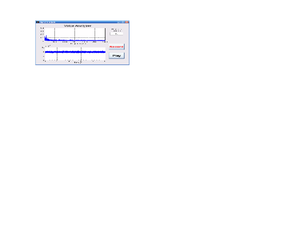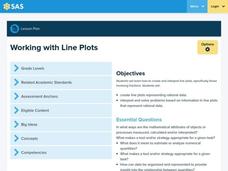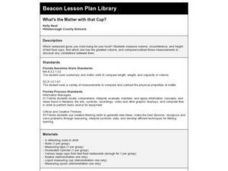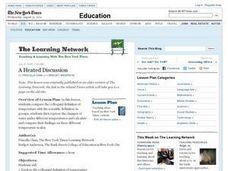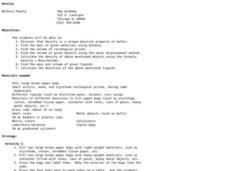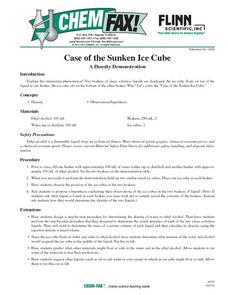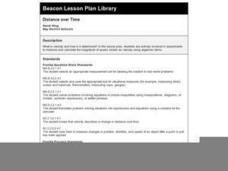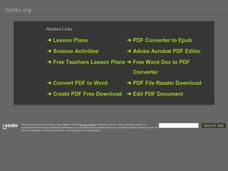Curated OER
Measuring Yourself Using the Metric System
Students measure using the metric system. In this geometry lesson, students solve problems using grams, meters and liters. They convert between the US units of measurements and the Metric System.
Curated OER
Measuring Volume/Capacity Using the Metric System
There is more than one way to measure an amount, as learners discover by applying multiple measurement tools in these activities. Centimeter cubes, cylinders, beakers, and measuring cups are used to find the volume of regular and...
CK-12 Foundation
Fraction Rounding to the Nearest Half: Beaker Math
Rounding fractions is the focus of a six-question interactive designed to boost concept proficiency. A measured beaker's water level increases and decreases as mathematicians move the tool to represent specific fractions. Questions...
Curated OER
Measuring Temperatures
Fourth graders participate in a teacher-led discussion about temperature--hot and cold. Each group of students is assigned specific materials for their lab experiment. They record temperatures measured in their journals and then plot...
Curated OER
Filling the Glass (Water, Air, and Fractions)
Learners predict which of two glasses is 1/2 full using visual estimation, height measurement, and liquid measurement methods. Mathematical equations to accurately solve the problem are determined and verified.
Curated OER
Beads, Balls, and Beakers
Students analyze the amount of space required to pack round objects. In this geometry instructional activity, students practice using space economically by practicing packing spheres into beakers. They then translate this concept to...
Curated OER
What's the Matter with that Cup?
Fourth graders measure volume, circumference, and height of fast food cups, find which one has the greatest volume, and compare/contrast those measurements to discover any correlations between them.
Curated OER
How Low Can You Go?
Fourth graders experience measuring temperatures after determining, by touch, whether water is hot or cold. They use a thermometers to measure the temperature of water in three cups of water. Using a vertical number line, they write the...
Curated OER
A Heated Discussion
Students compare the colloquial definition of temperature with the scientific definition. They, in groups, then explore the changes of water under different temperatures and calculate and compare their findings on three different...
Curated OER
"Space" Exploration
Fourth graders identify the attribute of volume of an object. Units of measurement are reviewed and utilized in this lesson.
Curated OER
A Weighty Task
Students aim to explain the need for standardization of units of measurement. They pose their own standards for the value of a kilogram and compare them with the currently used standard.
Curated OER
Density
Students find the mass, volume, and density of various objects. For this density measurement lesson, students observe how same-sized objects can have different masses, then use water displacement to find the density of each object and...
Curated OER
Compared to What? Comparing the Density of Different Liquids
Students work in groups to compare the density of different liquids. In this density lesson, students use cooking oil, liquid detergent and water to measure density. Students record their results and check the accuracy of their...
Curated OER
Chemistry: The Case of the Sunken Ice Cube
Students examine a density demonstration involving ice cubes and beakers of water and alcohol. After observing how one ice cube floats in water and sinks in alcohol, they determine which mixture of the two would suspend the ice cube in...
Curated OER
Hot Time in the Classroom
Fourth graders, in groups, examine how temperature is a measure of the average translational kinetic energy.
Curated OER
Pumpkin Properties are a Smash!
Students receive a miniature pumpkin and proceed through several stations to measure a variety of physical properties. The data is entered into a data sheet and the mass and volume measurements are used to calculate density. They also...
Curated OER
Water Cycle: Weather Lesson 1
First graders go on a water walk, collect weather data, and measure rainfall for a month. They examine the water cycle in this series of lessons.
Curated OER
Distance over Time
Students analyze velocity and how it is determined. They experiment with velocity in order to measure and calculate the magnitude of speed. They use examples in their novel "Skateboard Renegade" to relate velocity to real life situations.
Curated OER
Space Exploration
Fourth graders observe an empty 14 oz. clear plastic cup and measure how much water the cup can hold when it is completely full. They work in groups to fill the plastic cup, but half of the groups receive a smaller vial and the other...
Curated OER
Vision Props of Signed Numbers
Students explore the concept of titration. In this titration lesson, students observe acid and alkaline reacting. Students discuss pH factor, measuring acidity, neutrality, and alkalinity of liquids. Students put the pH of liquids on a...
Curated OER
Water Quality Monitoring
Young scholars study the water quality of a stream in their area, by measuring the temperature, pH, alkalinity and conductivity. They integrate biology with earth science when using the microscope to study the living organisms in the water.
Curated OER
Efficiency Means Getting More for Less
Young scholars measure water and make predictions about efficiency.
Curated OER
Antacid Tablet Race
Students complete experiments to determine how rocket fuel is affected by surface area and temperature. They compare the reaction rates of antacid tablets. They discuss their results to complete the lesson.
Curated OER
Making Hypotheses
Fourth graders practice making hypotheses about what they believe occur as they perform an osmosis experiment in class. This experiment is designed to illustrate how important it is to make an accurate hypothesis.


